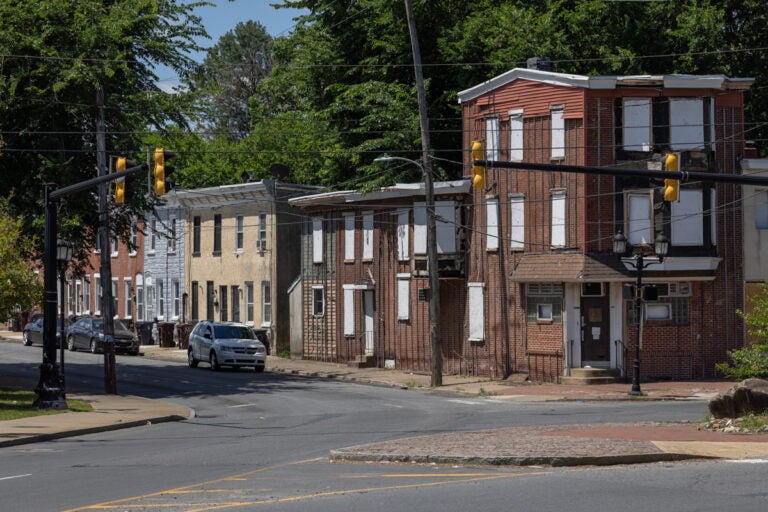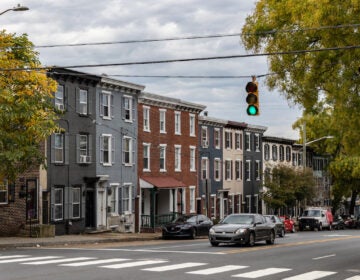Regulations on short-term rentals or rent control could help solve Wilmington’s affordable housing crisis, advocates say
Short-term rentals in Wilmington are in the crosshairs as city officials work to solve the affordable housing crisis.

Homes near downtown Wilmington. (Kimberly Paynter/WHYY)
From Philly and the Pa. suburbs to South Jersey and Delaware, what would you like WHYY News to cover? Let us know!
It’s been more than three months since former Wilmington City Councilwoman Bregetta Fields made an attempt to enforce strict regulations on short-term rentals within Wilmington.
Ordinance 0509 pointed to problems caused by short-term rentals like AirBnBs, including issues like “noise, trash, parking and traffic, as well as more serious issues like adversely impacting affordable housing and neighborhood character.”
The ordinance would give the city broad authority to oversee where short-term rentals could be established and make sure the rental properties would “not result in changes to or adversely affect the residential character of the residential building and/or neighborhood.”
The measure was hotly contested late last year and was pulled amid criticism. Still, Fields promised those attending a December committee meeting that this issue will come up again.
“The committee chair [Maria Cabrera] promised me she would work on this,” Fields said.
Access to affordable housing has become a burden for many families in Wilmington, a city racked by poverty. About 20% of Wilmington residents are experiencing poverty, according to 2023 data collected by the U.S. Census.
In addition, average rental costs in the state of Delaware surged nearly 24% in 2021 and an additional 14.5% in 2022, leaving many Wilmington residents with limited affordable housing options.
With a new-look city council following November’s election and a housing crisis crippling the city, one question still remains: How will the city of Wilmington tackle the lack of affordable housing in the city?
The answer may not be all that simple.
“I think a challenge [we’re facing] is that people are focused on supply, which is important,” said Ann Aviles, associate professor at the University of Delaware. “However, it does little, if anything, to provide access to some of the lowest income tenants.”
Wilmington is not the first city in the U.S. to attempt to regulate short-term rentals in favor of affordable housing. In fact, the battle with short-term rentals like AirBnBs have been a focal point for many local officials across the country.
Short-term rentals, in recent years, have shouldered much of the blame for rising housing costs across the country. The prevailing thought is that housing units that would typically be available for renters and buyers are, instead, being used as short-term housing options.
“Like many parts of the U.S., Wilmington has experienced a shortage of homes for sale,” said Diane Salvatore, a member of the Delaware Association of REALTORS’ Public Policy committee. This limited supply has kept prices elevated and created competition among buyers, especially for well-maintained, move-in-ready homes.
To make more housing units more available, several cities and municipalities in the country have implemented sweeping regulations to short-term rentals like AirBnBs. In Irvine, California, short-term rentals have been banned for more than seven years, which has been relatively successful for the city.
According to a 2021 study conducted by Real Estate Economics, the ban contributed a 3% — or $114 — drop in rental prices.
The legislation Fields introduced in Wilmington last spring wouldn’t have placed an outright ban on short–term rentals. Instead, the bill would have limited how many housing units one could use as a short-term rental. Owners would also be required to apply for permits, complete a class and follow new health, safety and noise control guidelines.
Among the litany of fears Wilmington residents had with Fields’ proposed legislation was the exact reason why many economists think the ban in Irvine worked — enforcement.
“I guess you want to regulate, but who’s really going to watch over it? Me, the other neighbors, we’re going to have to look and see if there is a violation,” Wilmington resident Michelle Shane asked during a December city council meeting.
With no action on Fields’ effort to regulate short-term rentals, Wilmington is still plagued with a housing crisis. Rising rent prices and a limited number of housing units leave many Wilmington residents in dire need of a place to live.
According to a study conducted by Housing Alliance Delaware, more than 1,300 people in Delaware experienced homelessness on a given night in 2024, a 9% increase from 2023.
‘Housing as a guaranteed, basic human right’
Carol Banks, a short-term rental operator in Wilmington, works closely with brokers in the city to assist low- and middle- income residents to find safe places to live. Her work allows her to “make rates more affordable” for short-term stays, which are any stays that are 30 days or longer.
Short-term rentals, however, aren’t always an affordable solution for people searching for housing. The average price for a 30- day stay in Wilmington is $2,910, nearly $400 more than the average rent for a three- bedroom house in Wilmington, according to Airbtics — a site that calculates short-term rentals statistics.
Some housing advocates in Wilmington believe that solutions that eliminate alternatives for Wilmington residents will only exacerbate the crisis, claiming that solutions favoring the market will always put the humanity of the crisis on the backburner.
“Part of our responsibility is to really shift the conversation away from housing as a commodity into housing as a guaranteed, basic human right,” Aviles said. “Most folks see housing as this commodity, and that is highly problematic because when your focus is on the bottom line, you are taking the human element out. Many landlords are much more focused on making money than on providing people with housing.”
That idea is also echoed by Branden Fletcher Dominguez, a tenant organizer with the City of Wilmington Autonomous Tenants’ Union. Fletcher Dominguez believes that shifting to building more housing will just continue to push out low- and middle- income families, a demographic that’s often priced out of the already existing luxury housing in Wilmington.
“Luxury housing doesn’t solve affordability,” Fletcher Dominguez said. “Market-driven solutions are constantly prioritizing profit over affordability and leaving too many renters in cities including Wilmington behind.”
Making sure new housing is affordable is crucial to making headway in solving Wilmington’s housing crisis. One method that housing advocates in Wilmington support is some form of rent stabilization.
Rent stabilization would limit how much landlords can raise rent year to year. Typically, the rate is between 2%two and 6%six percent. Currently, cities in 33 states across the country have rent stabilization ordinances.
The concept has even reached Wilmington City Council, as Councilwomanember Shané Darby reintroduced a rent stabilization bill at the council’s April 3 meeting.
The legislation would limit landlords in how much they can raise rent at their properties within a 12-month span and establish a rent ceiling, which would be the maximum amount a landlord could charge for a unit.
While she doesn’t think rent stabilization will be a long-term solution for Wilmington’s housing crisis, Aviles does believe rent stabilization is a necessary move to limit the damaging effects of the housing market.
“We know there’s not enough housing, so until we get enough housing, we need some stop gap measures.”
It’s unclear whether or not short-term rentals will, once again, reach the floor at City Council. If it does, advocates say more needs to be done to ensure all voices and perspectives are heard.
“Many [of these] conversations [with] policy makers and landlords don’t have renters at the table,” Aviles said. “It’s often other landlords or other people who have a vested interest in continuing to focus on housing as a commodity. Legislators need to have conversations with people in the community.”

Get daily updates from WHYY News!
WHYY is your source for fact-based, in-depth journalism and information. As a nonprofit organization, we rely on financial support from readers like you. Please give today.






